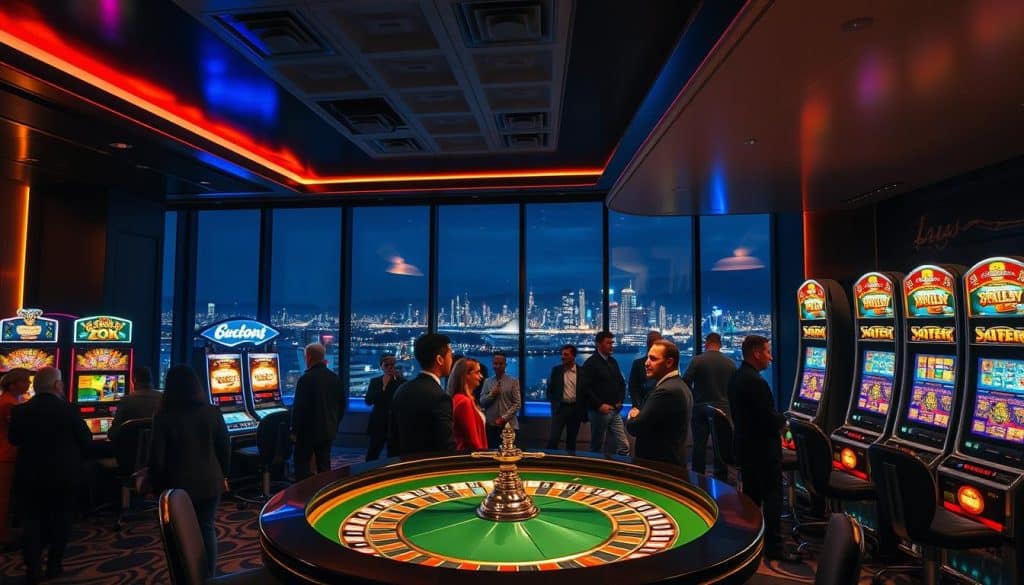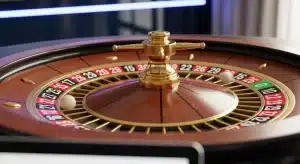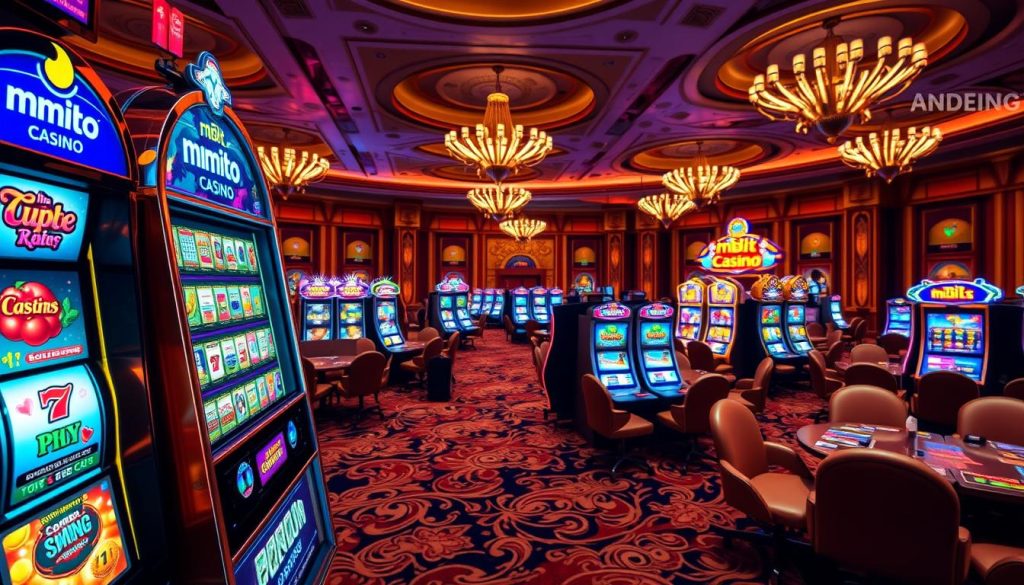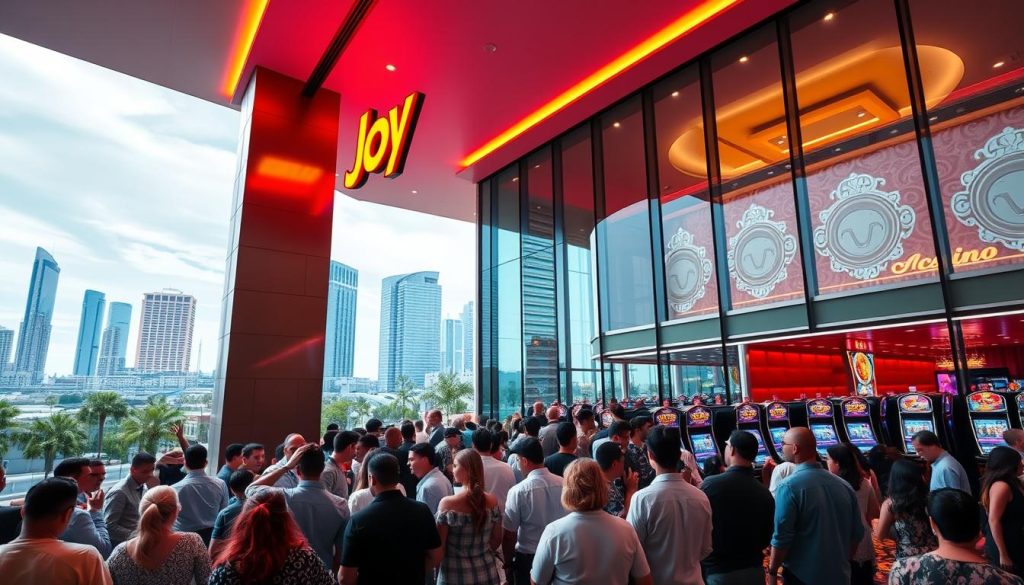Did you know that 67% of regular pokie players in New Zealand believe they can influence the outcome? Many think timing button presses or choosing specific machines helps. I’ve observed this belief firsthand in gaming venues across the country.
I’m not offering a winning system. Those don’t exist. Anyone claiming otherwise is deceiving you. Instead, I’ll clarify what really happens inside these machines during play.
Gambling myths persist due to two main reasons. Our brains struggle with randomness, seeking patterns where none exist. Also, New Zealand casinos haven’t always been clear about pokie operations.
I’ve seen many people make choices based on fiction. Through observation and fact-checking, I’ll address common gaming venue myths. This isn’t about judging. It’s about understanding the actual mechanics behind the flashy exterior.
Key Takeaways
- Over two-thirds of regular players believe they can influence random outcomes through timing or machine selection
- No guaranteed winning systems exist for pokies—claims otherwise are fraudulent
- Human psychology makes us see patterns in truly random events
- Casino transparency about gaming mechanics has historically been limited in New Zealand
- Understanding actual machine operations helps players make informed decisions
- This guide focuses on facts and personal observations, not gambling strategies
Introduction to Slot Machine Myths
Modern slot machines are complex digital devices. Gambling myths shape how players interact with these machines. Many misconceptions arise from not understanding the technology behind slots.
People create stories when they don’t grasp how things work. This is especially true for slots. Flashy lights and graphics hide the inner workings of these machines.
Understanding Slot Machines
Modern pokie machines are computers with advanced software, not mechanical devices. They use random number generators (RNGs) that produce number sequences constantly.
Pressing spin tells the machine to stop at its current sequence. The spinning reels are just a visual show of the computer’s decision.
RNG technology decides outcomes in milliseconds. The visuals are purely for entertainment. This fact disproves many slot machine superstitions.
Player rituals don’t affect outcomes. The computer only follows mathematical algorithms, not human behavior.
The Popularity of Slots in New Zealand
New Zealand has a unique relationship with pokie machines. They’re found in community spaces, not just casinos. This accessibility has changed gambling habits.
You can easily find gaming machines in local pubs. This integration has normalized gambling in potentially harmful ways.
New Zealand has one of the highest rates of gambling machines per capita. Many people approach pokie machines casually, as a social activity.
Regular Kiwis often make decisions based on false beliefs about these machines. This mix of accessibility and misconceptions can lead to poor choices.
Purpose of Debunking Myths
Misconceptions cost people real money. Believing a machine is “due” to pay out is following superstition, not strategy.
Slot machine myths aren’t harmless. They keep people playing longer and betting more than planned. These beliefs clash with how RNG technology actually works.
This article aims to provide accurate information for informed decisions. Understanding how slots work removes the mystique and reveals their true nature.
The following sections will address specific myths with technical explanations. We’ll explore common misconceptions and examine the science behind slot machines in New Zealand.
Common Myths About Slot Machines
Casino floors buzz with whispered theories about rigged slots and magical timing strategies. These myths spread like wildfire, influencing players’ decisions. However, most “knowledge” about slots comes from our brain’s tendency to find patterns.
Our minds seek patterns even where none exist. This can be costly when you’re feeding money into a machine. Let’s examine what’s really happening inside these machines.
The Reality Behind Fixed Machines
Many believe casinos can manipulate individual machines at will. This myth suggests staff can tighten machines during busy times or adjust payouts remotely. However, this is far from the truth.
Slot machines operate with fixed payout percentages programmed into their system chips. Changing these requires physical access, documentation, and approval from gaming regulators. In New Zealand, the Department of Internal Affairs oversees strict compliance requirements.
The misconception about rigged slots usually stems from the expected outcome—most sessions end in losses. This isn’t manipulation. It’s how probability works with a built-in house edge.
Why Hot and Cold Machines Don’t Exist
Players often believe they can spot “hot” machines that are paying out. Others think “cold” machines are “due” for a win. Both strategies misunderstand how slots work.
Each spin is an independent event. The machine doesn’t remember past spins or track wins and losses. When you press the button, you’re triggering a single, random event.
Think of flipping a coin. After five heads, the chance of tails is still 50/50. Slots work the same way.
Understanding Random Number Generators
The Random Number Generator (RNG) is the heart of slot machines. Some players think they can time button presses or predict winning sequences. These beliefs show a misunderstanding of the technology.
The RNG generates thousands of numbers per second, even when nobody’s playing. Pressing spin simply samples the number at that exact moment. There’s no pattern to predict or better moment to play.
Modern RNGs use complex algorithms that are nearly impossible to crack. Gaming commissions regularly test these systems to ensure true randomness. Any deviation would be quickly detected.
Accepting the reality of how slots work is crucial. It helps you make informed decisions about whether and how to play. Remember, pure randomness governs these machines, not patterns or strategies.
Statistics on Slot Machine Play in New Zealand
New Zealand gambling data reveals surprising truths about the industry. Every spin, win, and loss is part of a system based on math and behavior. These numbers show us what’s really happening at pokie machines.
The stats challenge what we think we know about gambling. They reveal where money goes and who’s playing. Let’s explore the data shaping the slot machine conversation in New Zealand.
The Real Numbers Behind Gambling in New Zealand
New Zealanders spend more than $2.5 billion annually on gambling activities. Pokies make up about 40% of total gambling revenue, according to the Department of Internal Affairs. This amounts to hundreds of millions flowing through these machines yearly.
New Zealand has one of the highest gambling spends per person globally. The average loss per gaming machine is over $50,000 a year. These numbers represent real money from real people across the country.
Here’s how gambling revenue breaks down across different sectors:
| Gambling Type | Annual Revenue (NZD) | Percentage of Total | Number of Venues |
|---|---|---|---|
| Pokies (Non-Casino) | $850 million | 34% | 1,350+ venues |
| Casino Gaming | $650 million | 26% | 6 casinos |
| Lotteries | $580 million | 23% | Nationwide |
| TAB Racing/Sports | $420 million | 17% | 650+ outlets |
How Slot Machine Usage Has Changed Over Time
Pokie play has changed a lot in the past decade. From 2010 to 2020, the number of gaming machines in New Zealand decreased by about 15%. However, this didn’t lead to less gambling.
Revenue per machine has increased significantly during this time. Fewer machines are handling more play, showing pokies aren’t becoming less popular. Several factors have influenced recent gambling trends in NZ:
- Regulatory reforms limiting machine numbers in certain areas
- Venue closures in lower socioeconomic communities
- Technological improvements making machines more engaging
- Economic fluctuations affecting discretionary spending patterns
- The COVID-19 pandemic’s massive impact on venue-based gambling
The pandemic disrupted gambling habits significantly. During lockdowns, land-based pokies were completely off-limits. Many players turned to online gambling, a trend that continued after venues reopened.
Pokie venue revenue dropped 22% in 2020, while online gambling grew exponentially. Younger players who might have visited physical venues developed online gambling habits instead. This shift is changing the industry in ways we’re still understanding.
Who Actually Plays These Machines
Pokie players are more diverse than you might think. Age, income, education, and location all play roles in New Zealand’s gambling community. Players aged 35-54 make up about 45% of regular pokie users.
Younger adults (18-34) account for 25% of players, while those over 55 make up 30%. Women represent about 48% of regular pokie players, challenging the idea that gambling is mostly male.
Lower-income areas have more gaming machines per person. Some Auckland and Wellington suburbs have three times more machines than wealthier areas. This reflects operators’ strategies to meet demand.
Lower-income households spend a higher proportion of their income on pokies compared to wealthier players. A $30,000 income household might spend 5% on gambling, while a $100,000 household spends less than 1%.
Education also affects gambling patterns. Players with higher education gamble less often and at lower stakes. Understanding these demographics helps address myths and develop better support systems for those in need.
The Science of Winning at Slot Machines
Grasping slot machine science won’t make you rich, but it’ll prevent costly errors. No strategy can change the casino’s mathematical edge. However, understanding the math helps you make smarter choices about your spending.
Knowledge empowers you to avoid casino payout myths. These myths cost Kiwi players thousands every year. Let’s explore how to make informed decisions about slot machines.
Understanding Payout Percentages
Return to Player (RTP) is crucial for setting realistic expectations. A 92% RTP means the machine returns $92 for every $100 wagered over millions of spins.
This doesn’t guarantee $92 back from your $100 tonight. RTP calculations happen over millions of plays. Your individual session is statistically insignificant in the bigger picture.
Casinos aren’t here to break even. The 8% difference is the house edge, mathematically guaranteed over time. Be wary of claims about systems beating this edge.
Common myths involve “loose” machines or daily payout quotas. These ideas don’t hold up mathematically. RTP percentages are calculated over a machine’s lifetime, not daily or per player.
The Role of Probability and Odds
Major jackpot chances are incredibly slim. We’re talking odds in the millions or tens of millions. Modern slots use random number generators with carefully calculated outcomes.
For progressive jackpots, odds can be 1 in 50 million or worse. You’re more likely to be struck by lightning than hit such a jackpot.
The gambler’s fallacy is believing past results influence future outcomes. Each spin is independent, with identical odds to the previous one. The RNG doesn’t remember past spins.
How Volatility Affects Gameplay
Understanding game volatility is key to slot strategy. Volatility describes how a game pays out over time. It’s more important than most players realize.
High volatility means bigger potential wins but longer dry spells. You might deplete your bankroll without significant wins. When you hit, payouts can be substantial.
Low volatility games offer frequent small wins but rarely life-changing amounts. Your bankroll lasts longer, providing more entertainment time. The trade-off is smaller potential wins.
Neither approach is inherently better. They represent different risk profiles. Choose based on your bankroll size and gaming goals. Honest self-assessment is crucial.
Consider how much you can afford to lose and your desired playing time. Are you seeking entertainment or chasing a specific amount? Your answers should guide your volatility choice.
Tools and Resources for Slot Machine Players
Gambling tools have evolved significantly over the past decade. They’ve gone from basic calculators to comprehensive player resources. These tools now offer real-time insights into gambling behavior.
These resources are crucial for responsible play, especially in New Zealand. Slot machines are highly accessible there. The right tools can help prevent gambling problems before they start.
Apps That Track Your Play
Player analytics tools have become incredibly advanced. These apps monitor spending patterns, session duration, and win-loss ratios. They even track the time of day you’re most likely to play.
Some tracking software works independently of casinos. This independence is important. It avoids conflicts of interest when casinos provide self-monitoring tools. Third-party apps give you objective data without subtle nudges to keep playing.
- Session timers that alert you when you’ve been playing longer than intended
- Spending trackers that compare your actual expenditure against pre-set budgets
- Frequency monitors that flag increasing play patterns before they become problematic
- Win-loss records that show your actual results over time, not just memorable big wins
- Emotional state logging to identify triggers that lead to extended sessions
These systems provide hard data when your memory might be selective. We tend to remember big wins more than accumulated losses. Analytics tools keep an honest record of your gambling activity.
“What gets measured gets managed. Self-monitoring is the foundation of responsible gambling behavior.”
Many casino apps now include built-in analytics features. While this shows concern for player welfare, approach these with caution. Their effectiveness depends on how prominently they’re displayed and if they actually interrupt play.
Finding Your Tribe Online
Online community resources can be valuable, but use critical thinking when engaging with them. Gambling forums exist across a wide spectrum. Some offer helpful harm minimization, while others amplify myths and misconceptions.
The best communities focus on realistic expectations and mutual support. They share what doesn’t work as readily as what does. Avoid groups that claim consistent profits or promote unreliable betting systems.
Quality player resources in community form typically feature:
- Moderators who actively challenge misinformation about how slots work
- Regular discussions about setting and maintaining boundaries
- Support threads for people struggling with problem gambling
- Realistic perspectives on winning probabilities and house edge
- Regional information specific to New Zealand regulations and venues
Reddit communities like r/problemgambling and r/responsiblegambling offer international perspectives with strong moderation. For New Zealand-specific discussions, forums connected to harm minimization organizations provide better localized support.
Where to Find Credible Information
Educational websites are the best source of evidence-based information for players. Look for legitimate institutional sources that prioritize education over profit. Avoid casino blogs or affiliate sites promoting bonuses.
For New Zealand players, start with these authoritative resources:
Problem Gambling Foundation of New Zealand offers comprehensive information about gambling risks and support services. Their materials are research-based and free from gambling industry ties.
Department of Internal Affairs provides detailed information on gambling regulations and player rights. They explain how slot machines are monitored for fairness in New Zealand.
Academic research from New Zealand universities publishes peer-reviewed studies on gambling behavior and harm patterns. These papers offer valuable insights into the science behind slot machines.
International resources like the UK Gambling Commission and PubMed also offer valuable information. They provide universal principles even if specific regulations differ.
These sources are valuable for their accuracy and transparency about limitations. They openly discuss what we don’t know about gambling, promoting intellectual honesty.
Combining self-monitoring tools, thoughtful community connections, and credible resources creates a framework for informed play. This approach helps you gamble with objective data and evidence-based understanding.
FAQs About Slot Machines
Slot machines are often misunderstood. People ask the same questions repeatedly. These questions reveal common misconceptions about slot games.
Let’s explore the three most frequent inquiries. We’ll provide clear, factual answers to clear up any confusion.
What Are the Odds of Winning?
Winning odds vary based on what you consider a “win”. On a typical New Zealand slot, you might win something once every five spins.
However, most wins pay less than your bet. The odds of winning a substantial amount are much lower, about 1 in 10,000.
For a life-changing jackpot, it’s 1 in several million spins. Let’s break down the odds for a machine with 95% RTP:
- Small wins (less than bet amount): approximately 1 in 4 spins
- Break-even wins (equal to bet): roughly 1 in 10 spins
- Moderate wins (5-20x bet): around 1 in 100 spins
- Major wins (100x+ bet): approximately 1 in 5,000 spins
- Progressive jackpot: anywhere from 1 in 500,000 to 1 in 5 million
Casinos always win long-term due to their large scale. They process millions of spins across thousands of machines. Their 5% house edge means they keep $5 of every $100 wagered.
How Are Payouts Determined?
The payout process is quite intriguing. When you press spin, a Random Number Generator produces a number. This number determines the reel positions and your potential win.
The outcome is set before the reels spin. The spinning is just for show and excitement.
This fact disproves a common myth. You can’t influence the outcome by stopping the reels at the right time.
Button timing doesn’t matter. The machine doesn’t care about your reflexes or timing skills.
Can Players Influence Outcomes?
The short answer is: No. Players can’t influence outcomes through timing, bet sizing, or lucky charms.
These myths persist because humans want to feel in control. We struggle to accept pure randomness.
The outcome is set when you press the button. The Random Number Generator works independently of:
- How fast or slow you press the spin button
- Whether you use max bet or minimum bet
- The time of day you play
- How long you’ve been playing
- Whether the previous player won or lost
This might be disappointing, but it’s honest. The machine doesn’t remember you or develop patterns based on your style.
Each spin is independent, with the same odds as any other. Accepting this can make playing more enjoyable.
Predictions for the Future of Slot Machines
The next five years will bring massive changes to slot machines. This evolution goes beyond flashy graphics or loud sounds. It’s a fundamental shift in operation, regulation, and player access.
New Zealand’s gambling future depends on three key developments. Manufacturers are testing new concepts. Regulators are updating frameworks. Player preferences are shifting dramatically. These changes will determine if pokies remain relevant to younger generations.
Innovations Reshaping Gaming Experiences
Gaming tech trends are more than cosmetic upgrades. Manufacturers are rethinking what a slot machine can be. Traditional spinning reels no longer satisfy players used to interactive video games.
Skill-based elements are being added to some machines. Bonus rounds might require quick reflexes or decision-making. This affects the size of the win, not whether you win.
Virtual reality slots are moving beyond concept stage. Some models immerse players in 3D environments. Players interact with slot elements spatially. The core RNG mechanics remain unchanged.
Cryptocurrency integration is another key development. Some machines now accept Bitcoin and other digital currencies. This offers faster transactions and enhanced privacy. NZ venues’ adoption depends on regulations and banking partnerships.
Player tracking has reached sophisticated levels. Machines remember your preferences and adjust difficulty in bonus rounds. They can even modify visual themes to match your interests. This raises engagement and ethical concerns.
| Feature Category | Current Standard | Emerging Technology | Player Impact |
|---|---|---|---|
| Gameplay Mechanics | Pure chance with fixed patterns | Skill-based bonus elements | More engagement, same house edge |
| Display Technology | HD touchscreens | VR/AR immersive environments | Enhanced experience, potential overstimulation |
| Payment Systems | Cash and card readers | Cryptocurrency and mobile wallets | Faster transactions, reduced friction |
| Personalization | Basic player card tracking | AI-driven preference adaptation | Tailored experience, ethical concerns |
Hybrid games blend slot mechanics with video game progression systems. These target younger demographics who find traditional pokies boring. They might include leveling systems, achievement unlocks, and narrative elements.
Regulatory Evolution and Compliance Standards
New Zealand’s gambling regulation is moving towards transparency and harm reduction. The political conversation is shifting as more research on gambling harm emerges. What seemed acceptable before now faces scrutiny.
Transparency requirements will likely mandate clearer disclosure of odds on machines. Expect prominent displays showing exactly what players face. Some places already require machines to show money inserted versus paid out.
Responsible gambling tools built into machines will become standard. These include session time limits, loss limits, and reality check pop-ups. The technology exists now; regulatory mandates will drive adoption.
Advertising standards are tightening globally. New Zealand will follow this pattern. Expect restrictions on ads targeting vulnerable populations or portraying gambling as a financial solution.
Digital Gaming Platforms in New Zealand
The online casino NZ situation remains legally ambiguous. International operators serve Kiwi customers despite unclear legal authorization. Many players use offshore sites without understanding the legal risks.
My prediction: Within five years, New Zealand will legalize and regulate online gambling. Or, they’ll block access. The current grey area benefits only offshore operators who don’t pay taxes.
Legalization with regulation seems more likely based on policy research. This could generate tax revenue while providing consumer protections. Licensed operators would need to implement harm minimization tools.
Online slots use the same RNG principles as physical machines. But regulatory oversight varies dramatically. Some offshore operators use certified testing agencies. Others operate with minimal oversight, creating risks for players.
The merge of physical and online gambling creates regulatory challenges. These boundary questions will require careful policy development. Technology is erasing traditional distinctions between gambling types.
Evidence Supporting Myth Busting
Gambling research spans decades, debunking luck myths with scientific evidence. Slot machine workings, player beliefs, and outcome determinants have been extensively studied. The truth is measurable, testable, and backed by credible institutions.
Let’s explore the research, expert views, and real-world experiences supporting these findings. The gap between myth and reality is more than philosophical. It’s grounded in scientific evidence from reputable sources.
Research Studies on Slot Machines
Australian and New Zealand universities have conducted thorough gambling research. They’ve examined why myths persist despite contradicting facts. These are peer-reviewed studies published in legitimate journals.
A key finding relates to cognitive biases in gambling behavior. Studies show people struggle to internalize the independence of each spin. This occurs even when they intellectually understand the concept.
It’s like knowing coin flips are independent, but still feeling the next flip is “due”. Brain imaging reveals why slot machines are psychologically compelling. Near-misses trigger the same reward centers as actual wins.
Your brain releases dopamine even when losing money. This explains why people continue playing despite negative results. Math research confirms slot machines produce truly random outcomes.
Studies show betting systems can’t overcome negative expected value over time. The house edge is a mathematical certainty in every spin.
The house edge isn’t a temporary obstacle to overcome—it’s a mathematical certainty embedded in every spin, confirmed by decades of statistical analysis.
Humans are prone to seeing patterns in randomness. This trait helped our ancestors survive. However, it works against us with slot machines. The truth about slot machines often contradicts our intuitive pattern-recognition.
Expert Opinions
Mathematicians, regulators, psychologists, and reformed gamblers agree on one thing. You cannot beat slot machines consistently through any system or strategy. The math simply doesn’t allow it.
Gaming psychologists explain why myths persist despite evidence. Dr. Mark Griffiths has documented how cognitive distortions affect player behavior. These beliefs provide a sense of control in uncontrollable situations.
Casino regulators emphasize that gaming machines undergo rigorous testing. Every jurisdiction requires independent verification of Random Number Generators. This ensures fairness and maintains randomness in the games.
One consultant noted, “The industry doesn’t need to cheat—the math guarantees profit. Rigging machines would risk valuable licenses needlessly.”
Reformed problem gamblers offer unique insights. They’ve seen how gambling myths enable destructive behavior. Many believed in systems or “hot” machines before realizing these were self-deceptions.
- Mathematical consensus: House edge is mathematically insurmountable
- Psychological research: Cognitive biases explain persistent myths
- Regulatory evidence: Machines undergo rigorous independent testing
- Industry experts: No incentive exists to rig already-profitable games
Experts across disciplines agree: slot machines operate on verifiable randomness. Myths persist due to human psychology, not because they contain truth.
Testimonials from Experienced Players
Real stories add weight to statistics. Long-term players share hard-learned lessons about gambling research. These cautionary tales come from people who believed myths and paid dearly.
A Wellington player spent five years tracking video poker patterns. He kept detailed spreadsheets of symbols and outcomes. Eventually, he realized his “system” had cost him over $30,000.
“I was so sure I’d figured it out,” he said. “Looking back, I was just fooling myself with selective memory.”
A Christchurch player believed in hot and cold machines for years. She would swoop in after others’ losing streaks. After six months of honest tracking, she found her win rate unchanged.
The moment I accepted that every spin was truly independent—that’s when I started making better decisions about when to play and when to walk away.
A former casino regular tried various betting systems over three years. His conclusion? “The only consistent result was emptying my wallet faster. Every system failed because the fundamental math doesn’t change.”
These stories reinforce what research shows: experienced players eventually recognize outcome control myths as illusions. Those who maintain healthy relationships with slots accept randomness and treat play as entertainment, not investment.
The consistency of these realizations is striking. Different people, places, and times lead to the same conclusion. Myths feel true until rigorously tested. Then, scientific evidence always trumps wishful thinking.
Research, expert consensus, and real-world experience create a compelling case. When diverse sources agree, it’s worth listening. Myth-busting evidence is clear in professional circles. Only casual players cling to these myths.
Responsible Gambling Practices
Gambling can become a problem faster than you think. I’ve seen it happen to people who started out having fun. Understanding slot machine myths helps, but responsible gambling practices protect you from real betting risks.
Slot machines are designed to be engaging. This engagement can cross a line without you noticing. It’s crucial to recognize the potential dangers.
Recognizing Problem Gambling
Problem gambling signs aren’t always obvious. You might think it looks like losing your house or maxing out credit cards. However, it usually starts much smaller.
Here are the warning signs that deserve your honest attention:
- Spending more than you can afford – not just occasionally, but regularly dipping into money meant for bills or savings
- Chasing losses – returning to “win back” what you lost, convinced the next session will be different
- Gambling to escape problems – using slot machines as emotional regulation rather than entertainment
- Lying about gambling activity – minimizing how much time or money you’re spending, or hiding sessions from family
- Neglecting responsibilities – missing work, skipping social obligations, or ignoring family commitments to gamble
- Feeling preoccupied with gambling – thinking about your next session even when you’re not playing
If you recognize these signs, pay attention. That discomfort is important information. Problem gambling isn’t a moral failing or lack of willpower.
It’s a behavioral health issue that responds to treatment. Like other conditions, it can be managed with proper help.
Tools for Monitoring Play Behavior
Prevention works better than intervention. These strategies help you maintain control before problems develop:
Set limits before you start playing. Decide how much money and time you’ll spend. Stick to those limits regardless of winning or losing.
Use pre-commitment tools at New Zealand venues. Some casinos offer card systems that track spending and alert you to limits.
Avoid alcohol while gambling. Impaired judgment leads to poor decisions. That extra drink makes it easier to make risky choices.
Take regular breaks. Set a timer for every 30 minutes. Stand up and walk away from the machine. Physical distance helps restore perspective.
Keep gambling separate from other activities. If every outing includes pokies, you’re building unhealthy associations. Try to enjoy experiences without gambling.
Resources for Seeking Help
If you see warning signs or someone is struggling, gambling addiction help is available. Reaching out isn’t admitting defeat—it’s taking control back.
The Problem Gambling Foundation has a 24/7 helpline at 0800 664 262. Calls are free and confidential. They understand gambling problems without judgment.
The Gambling Helpline offers counseling services. They address individual and family impacts of problem gambling. Recovery often involves tackling these wider issues.
Peer support groups connect you with others who’ve faced similar challenges. Talking with someone who understands from experience can be powerful.
Self-exclusion programs let you ban yourself from gambling locations. These provide protection during moments of weakness. They help when urges feel overwhelming.
Most people with gambling problems recover with professional support. Seeking help is strength, not weakness. It takes courage to admit you need support.
Conclusion: Clearing the Air on Slot Machine Myths
Pokies across New Zealand show repeating patterns. Players often seek “due” or “hot” machines. These myths offer false hope in a system designed to extract money over time.
Random number generators ensure each spin is independent. No strategy or ritual changes your odds. The house edge remains constant and profitable for operators.
What We’ve Learned About Reality
Facts are clear. Machines don’t run hot or cold. The house edge stays unchanged. Operators profit from this mathematical precision.
Playing With Your Eyes Open
Informed gambling means accepting reality. You can still enjoy pokies for entertainment. Set strict spending limits. Treat wins as unexpected bonuses.
Never chase losses or use essential expense money. Responsible play is key to enjoying the experience.
New Zealand’s Unique Challenge
Our country faces a tension. Gaming machines fund community projects while harming problem gamblers. Gambling education helps bridge this gap.
Understanding how machines work empowers better decision-making. It helps you choose whether to play at all.
Remember this truth: pokies are engineered to take your money. They do this efficiently and reliably. No myth changes that mathematical certainty.










